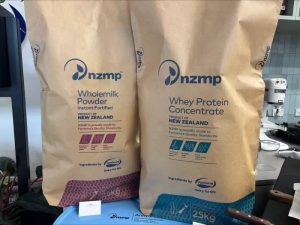“It’s just the best ice cream in the area,” Richardson said.


“It’s just the best ice cream in the area,” Richardson said.
With flavors like Beaumont Brownie Bliss, Izzo’s Malted Madness and Spartan Swirl, Law said that the Dairy Store stands out from other ice cream shops because of its MSU-themed flavors.
“Now what they need to do is bring back Honors College Coffee Toffee,” Law said. “Of course when I went to school here, back in the ‘70s, the only ice cream you got at the ice cream store was strawberry, chocolate, vanilla and that was it,” Law said.
The flavor selection, in combination with the quality of the ice cream, also makes the Dairy Store a favorite among current MSU students, like Kirsten Fentzke.
“I can taste the difference in freshness,” Fentzke said. “At least I like to think I can, as an ice cream connoisseur.”
MSU student Grace Elling said she heard that the Dairy Store uses real milk, from real cows.
“It’s really creamy,” Elling said. “It’s cool to be part of a campus that does everything very organically and locally.”
But here’s the scoop: your Dairy Store ice cream does not come straight from the MSU dairy cattle down the road.
“It’s one of those things that everybody assumes because the farms are just down the road,” MSU Dairy Plant production and operations manager Matthew Wilcox said.
The Dairy Plant has never been able to process raw milk for Dairy Store ice cream. That would require it to be a Grade A facility.
However, prior to the COVID-19 pandemic, the plant was able to process fresh cream in the ice cream-making process.
“We couldn’t just go get milk from the farm and bring it right here,” Wilcox said. “We have a truck here that somebody would drive to Ovid to pick up cream and bring it back to campus.”
The Dairy Store never exclusively used MSU cows’ milk for its ice cream. The MSU cows contribute raw milk to a plant in Ovid that is part of the Michigan Milk Producers Association dairy cooperative.
“Theoretically, yes, they were getting milk from the dairy farm here at Michigan State because it is part of a pooled co-op, but it’s not specifically directly from the cows here,” Wilcox said.
Dairy farms all across the Midwest transport raw milk to the Ovid plant, which is pooled together and processed into products like cream, cheese, butter and fluid milk. The cooperative then controls how much the farmer, or in this case, the MSU Dairy Farm, gets paid.
And then the COVID-19 pandemic happened. Along with the rest of the world, the Dairy Plant froze production in 2020.
“They kind of just walked away,” Wilcox said. “So when I came in, nothing was really set up to be shut down. It just shut down.”
In the midst of its two-year hiatus, the plant lost its manufacturing license because it was not being renewed, Wilcox said. That license is what allowed the plant to process cream and homemade mixes in its ice cream production.
“In the meantime, we’re operating under the Dairy Store’s license basically as a retail establishment,” Wilcox said. “So we’re able to use the ice cream equipment and make ice cream to the highest standard with the intention of only selling it through the Dairy Store.”
The plant has yet to be re-certified, but Wilcox said he is hopeful that will happen by the end of the year after necessary machinery updates and repairs are made inside the plant.
Wilcox said that the machinery sat for years without use.
The Dairy Plant currently shares the Dairy Store’s Ingham County food license to make ice cream using pre-pasteurized mixes from Meadowvale Dairy. Once the plant re-earns its manufacturing license, it will have the ability to make its own mixes and the Dairy Store has the potential to wholesale its ice cream.
Part of the reason the MSU Dairy Store remains a beloved part of the Lansing community is the mystery of where it comes from, Wilcox said.
“There’s no reason to hide it,” Wilcox said. “But we like the mystique.”
Legal notice about Intellectual Property in digital contents. All information contained in these pages that is NOT owned by eDairy News and is NOT considered “public domain” by legal regulations, are registered trademarks of their respective owners and recognized by our company as such. The publication on the eDairy News website is made for the purpose of gathering information, respecting the rules contained in the Berne Convention for the Protection of Literary and Artistic Works; in Law 11.723 and other applicable rules. Any claim arising from the information contained in the eDairy News website shall be subject to the jurisdiction of the Ordinary Courts of the First Judicial District of the Province of Córdoba, Argentina, with seat in the City of Córdoba, excluding any other jurisdiction, including the Federal.
eDairy News Spanish
eDairy News PORTUGUESE
